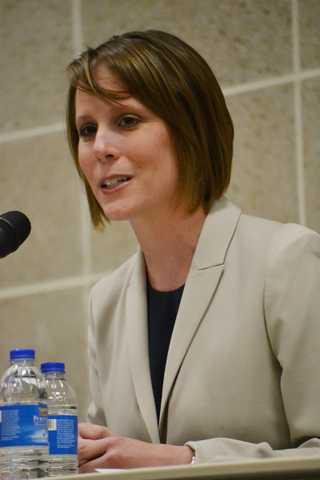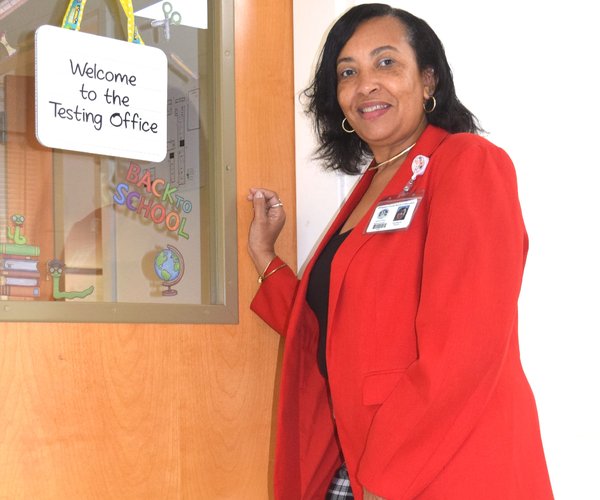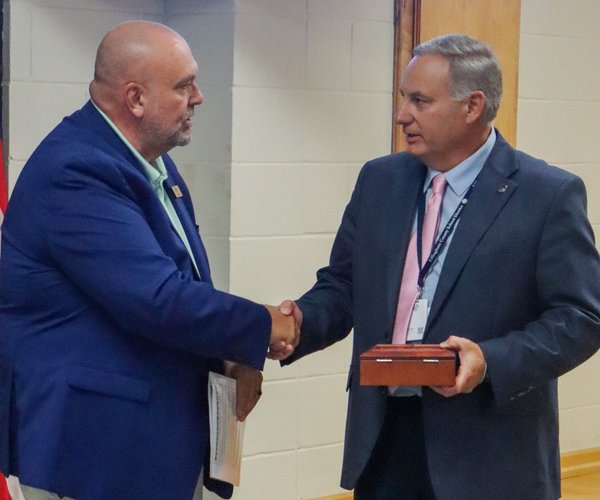The four candidates for the Effingham County Board of Education’s District 4 seat share similar views on a number of issues, so the race could likely come down to their experience and background.
Candidates Beth Helmly, Faith Jaudon, Ben Johnson and Amanda Phillips touted those credentials at Tuesday’s forum hosted by the Effingham Chamber of Commerce.
Helmly pointed to her more than 30 years as an educator, including serving as principal of Ebenezer and Effingham County middle schools.
“This is the person you need on your board, because I know more about how this system operates than anybody else at this table,” she said.
Jaudon, who works with students as a 4-H program assistant and a substitute teacher, talked about the son she and her husband DeWayne adopted after raising five children of their own.
“My hope tonight is that you too have felt the longing in my heart to nurture the children of Effingham County, and to see my willingness to sacrifice in order that they may achieve a better life,” she said.
Prior to becoming a stay-at-home mom for her two young children, Phillips managed a local business for six years.
“I’ve faced many, many issues dealing with setting and providing incentive and consequences, and finding the way to motivate people the most,” she said.
Johnson works for Georgia Timber Exports and also runs his own catering business. He and his wife Shannon have three children in Effingham County schools.
“Whether I win or lose, you will see me again in 2018 on the ballot,” he said. “I’m here to stay.”
The four-year term on the seat does not begin until Jan. 1, but the winner will take office sooner to fill the remainder of Mose Mock’s term. Mock stepped down earlier this year after his son was diagnosed with a rare form of cancer.
The winner will be determined in the May 20 primary if a candidate receives 50 percent of the vote plus one. If no one receives a majority, a July 22 runoff will be held between the top two vote-getters.
Budget boost?
The candidates gave similar answers to the question of whether they think having a larger school system budget leads to better test scores and higher graduation rates.
All made comments to the effect of “money can’t buy everything,” but also agreed that they would support increases to teachers’ salaries.
“Money does talk to some degree,” Jaudon said. “Our investment needs to be made with our teachers. You get what you pay for.”
Johnson stated, “They need to feel more appreciated. If you take care of the teachers — whether it’s benefits or it’s money — they will take care of your kids, bottom line.”
Helmly contended the only way to “buy” success in the classroom is to hire the right people.
“Yes, money helps in terms of maybe getting better-quality people,” she said, “but I’ve seen a lot of teachers do a lot with a lot less in the classroom, if you’ve got the right person in there.”
Phillips pointed to the example set by her mother, who was a teacher for more than 30 years.
“It wasn’t about the money for her — it was about her students,” Phillips said. “If you have a caring, loving teacher who will help someone who is not up to par, it’s the teacher who makes the difference.”
Merit pay
Discussion of teacher salaries led to the next question, about the candidates’ thoughts on performance-based compensation for teachers.
The question referenced Georgia House Bill 244, which, starting in 2015, calls for teacher pay to be based on student surveys, student test scores and a minimum of four evaluations per teacher per year by administrators.
“My fear with House Bill 244 is that we’re only going to be teaching toward test scores,” Phillips said. “Their pay, or even their job, is going to be based off of test scores. There has got to be a compromise somewhere.”
Johnson answered succinctly: “It shouldn’t be all on their experience. I believe it should be what’s in their heart.”
Jaudon said judging teachers on merit is “vitally important,” but added that it should not be the only factor.
“There are some teachers we know that are simply not called to teach. For whatever reason, they chose that profession, and often times they need to leave that profession,” she said. “But I never feel like a teacher should be judged off of the test scores of the students.”
Helmly pointed out the time commitment by teachers and administrators — and the paperwork — necessary to meet the requirements of HB 244.
“You’re pulling people away from the job they should be doing,” she said. “If you’ve got a good, quality teacher, you don’t need to burden them down with extra paperwork. And I don’t even know who’s going to have time to look at it.”
In closing
In their closing remarks, Helmly and Johnson both took jabs at the Common Core Georgia Performance Standards, which have drawn criticism from teachers, administrators and parents throughout the state.
Helmly said the school district needs “strong people to stand up against” Common Core, even though doing so could jeopardize some state and federal funding for education.
“Anytime you tell a teacher how they’re going to have to teach, it’s scary,” Helmly said. “Common Core tells you how to teach. Teachers have been handed scripts to read — and that would be very insulting to me as a teacher.”
Johnson added that Common Core is “not the best thing.”
“But can you throw it out today and pull in something tomorrow? Absolutely not,” he said. “But it definitely needs some adjusting.”
Jaudon stated that, through working with 4-H and as a substitute teacher, she has “seen first-hand the decline of the family unit and its effect on our children,” and pledged she would “prayerfully consider all options” prior to any decision she would make on the school board.
“It would behoove us as a community of educators — and we are all educators — to re-examine our motives,” Jaudon said.
Phillips reiterated her experience as a business manager, stating she was “very conservative” in dealing with finances and budgets.
“I want to find places where we can help our teachers do better in their classrooms,” she said. “If it means a little bit more money for the teacher, or for the classroom, we’ve got to try and find that.”








